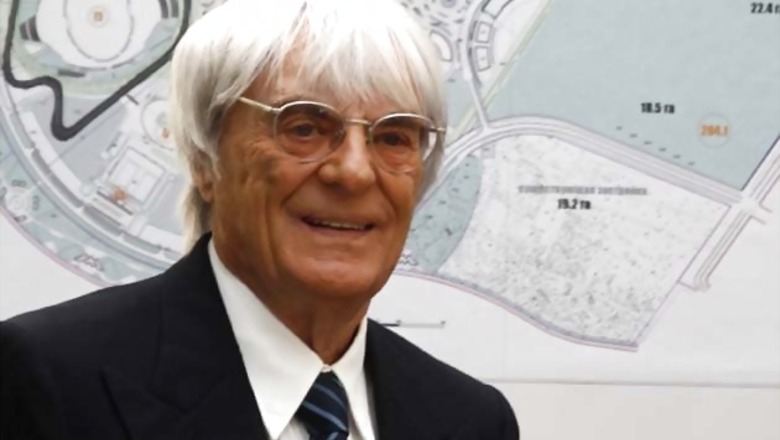
views
London: Formula One must bring rising costs under control to help struggling teams race on in tough economic circumstances, even if talk of impending crisis is wide of the mark, principals agree. The folding of Spanish-based HRT since the end of last season owed as much to the economic troubles of the team's debt-stricken homeland as to its lack of success on the track but it still flashed up warning signs.
"What one hears is that a lot of teams are facing a challenging financial situation, some more and some less," Sauber team principal Monisha Kaltenborn told Reuters at this week's first pre-season test in Jerez. "You have to react in some way or other to get the costs down because we are still at a level where maybe if we adapt in some ways you could still have more teams in there," she added.
HRT's departure has left 11 teams and 22 cars on the grid, still a relatively healthy number with commercial supremo Bernie Ecclestone telling Reuters in December that he would be perfectly happy with 10 teams. Some new sponsors have appeared on the 2013 cars making their test debut in Spain this week, such as BlackBerry with Mercedes, but there is no obvious clamour of major global companies looking to come in.
If all looks rosy - or purple thanks to a changed livery reflecting new title sponsor Infiniti - at champions Red Bull under the ownership of Austrian energy drinks billionaire Dietrich Mateschitz, it is less healthy elsewhere. All the teams are European-based and there are regular whispers and rumours about a number of them struggling with budgets, particularly with rising costs associated with a completely new V6 engine and rule changes scheduled for 2014.
"We've taken some measures but I still think it is going to be tough for some of the teams to have a viable business model for a few years," McLaren team boss Martin Whitmarsh told reporters. Marussia's John Booth, whose tail-end team have the smallest estimated annual budget of around $60 million, detected echoes from a few years back when the exit of major car manufacturers like Toyota, Honda and BMW led to a 'resource restriction agreement' that has since lapsed.
"It (the sport) had to come to its senses a little bit," he told Reuters. "Maybe we are going through that period again. "I don't think it's a crisis, (but) maybe re-alignment is required." Formula One, whose planned $3 billion flotation was put on hold last year, is to all appearances a money-spinner that was expected to generate revenues of $2 billion in 2012. Yet much of that cash flows out of the increasingly global sport, whose European heartland is suffering and whose teams have for years demanded a far greater share of the revenues.
There has been some unease at the amount of time it took for the Nuerburgring to agree a deal to host this year's German Grand Prix, with the home race for Red Bull's triple champion Sebastian Vettel on July 7 being finalised only late last month. A 20th slot on the calendar, left empty for an unspecified European round after the postponement to 2014 of a planned grand prix in New Jersey, has gone unfilled - although there is a waiting list outside Europe for future races - after Turkey baulked at the price and finances proved an obstacle elsewhere.
Meanwhile the paddock has seen an increase in the number of 'pay drivers' - those who owe their seats as much to the cash they bring with them as their talents behind the wheel - and concern about what that might do to the sport's image. "For me it's personally sad that there are so many pay drivers in Formula One, the numbers have crept up," said Whitmarsh, whose new Mexican driver Sergio Perez was seen as such by some when he made his debut with Telmex-sponsored Sauber in 2011.
"You would hope that in the premier form of motor racing worldwide, you wouldn't have to have pay drivers...the reason that some of those guys are pay drivers is that actually they are fundamentally not good enough to be in Formula One. "But I think it's difficult for us in Formula One to say to some of these teams 'you can't have pay drivers' because sadly they have become an important constituent of their budgets," added the Briton.
Retired Austrian triple champion Niki Lauda, now part of the Mercedes team management, was a 'pay driver' when he started in the 1970s and the phenomenon has waxed and waned over the years. Since the championship started in 1950 a long queue of teams have come and gone with the last new entrants in 2010. Mercedes principal Ross Brawn, a former Ferrari technical director who has been in Formula One for decades with big teams and small, said the situation was nothing new.
"We are affected by the cycles of the economy of the world, we can't ignore that," he told reporters this week. "It is a constant battle, we can never rest and say that it's okay. we are always going to be working to contain costs and improve the quality of Formula One and make it more appealing to partners and sponsors. "In the 34 years I've been in Formula One it's never been very different to be honest. There are always one or two teams at the bottom that are perhaps struggling to meet their budgets...but there's still a very strong core to Formula One."



















Comments
0 comment